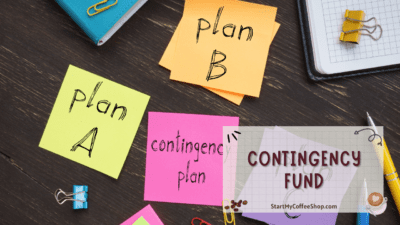Opening a coffee shop is a dream for many passionate entrepreneurs. The aroma of freshly brewed coffee, the warm ambiance, and the opportunity to create a community hub are alluring prospects. However, it’s crucial to understand the costs involved in turning this dream into a reality.
Opening a coffee shop costs more than you expected. You must consider securing a location, renovations, equipment, staffing, and marketing expenses. Plan your budget effectively and turn your coffee shop dream into a great reality.
In this article, we’ll explore the various expenses you can expect when opening a coffee shop, helping you plan your budget effectively.
Location

Securing a suitable location is the foremost and pivotal factor when starting a coffee shop. The cost of the location is influenced by several key factors such as rent, size, and the popularity of the area.
Prime locations in bustling city centers, with high foot traffic and visibility, often command a higher price tag due to the potential for increased customer flow and exposure. On the other hand, suburban areas tend to offer more affordable options, allowing for cost savings in terms of rent.
When considering the location cost, it’s essential to strike a balance between the desired level of visibility and accessibility for your target market while also being mindful of the financial feasibility. Careful evaluation and research of potential locations will help you find the right balance between cost and the potential benefits that come with an ideal coffee shop location.
Read more about: How to Create a Coffee Shop Business Plan: From Concept to Cappuccino
Lease and Legal Requirements
Renting a space for your coffee shop involves more than just lease payments. It’s crucial to consider additional expenses such as legal fees associated with the rental process. This includes reviewing lease contracts to ensure clarity and fairness, obtaining necessary permits, and ensuring compliance with health and safety regulations.
To navigate these legal aspects effectively, it is advisable to seek guidance from a lawyer or consultant who specializes in small business startups. Their expertise can help you understand the terms and conditions of the lease, identify any potential risks, and ensure that you are meeting all legal requirements.
Investing in professional guidance upfront can save you from potential complications and legal issues down the line, providing you with peace of mind as you embark on your coffee shop venture.
Renovation and Interior Design
To transform a space into a cozy coffee shop, renovations, and interior design work are necessary. This process typically includes tasks such as painting, flooring installation, electrical and plumbing work, and the installation of essential equipment like coffee machines and seating arrangements.
Collaborating with an experienced contractor and interior designer can help you estimate and manage these costs effectively. They can provide insights into the specific requirements for a coffee shop setup, offer design recommendations that align with your vision, and ensure that the space is optimized for functionality and customer comfort.
By working with professionals who specialize in commercial renovations and design, you can navigate the process smoothly and create a welcoming atmosphere that enhances the overall coffee shop experience for your customers.
Equipment and Furnishings
Setting up a well-equipped coffee shop entails acquiring essential items such as espresso machines, grinders, coffee brewers, refrigerators, and seating furniture. To make informed purchasing decisions, thorough research of reputable suppliers is crucial.
Comparing prices and evaluating the quality of the equipment will help you obtain the best value for your investment. Additionally, consider whether buying or leasing the equipment is more suitable for your business. Leasing options may offer flexibility and lower upfront costs, but it’s essential to consider long-term maintenance expenses and warranties.
Carefully weighing the pros and cons of each option will enable you to make a sound financial decision while ensuring that your coffee shop is equipped with reliable and efficient equipment to meet the demands of your customers.
Inventory and Supplies
In addition to equipment and infrastructure, sourcing coffee beans, syrups, milk, pastries, and other supplies is a crucial aspect of running a coffee shop. These items will form a significant part of your ongoing expenses. Building strong relationships with local suppliers is beneficial, as it allows you to negotiate better deals, access fresh and high-quality ingredients, and ensure a reliable supply chain.
Collaborating with local suppliers can also contribute to a sense of community and support for other businesses in your area. It is important to include these supply costs in your budget and allocate funds for recurring purchases.
Additionally, don’t forget to account for disposable cups, napkins, cleaning supplies, and other miscellaneous items that are essential for day-to-day operations. Proper budgeting and sourcing strategies will help you maintain a steady flow of quality supplies while effectively managing your coffee shop’s expenses.
Staffing and Training

Building a competent and customer-focused team is crucial for the improvement of your coffee shop. It’s essential to carefully consider the number of employees required, their salaries, benefits, and training costs to ensure a smooth and efficient operation.
Firstly, determining the right number of employees depends on the size of your coffee shop, expected customer traffic, and the range of services you offer. Consider the roles needed, such as baristas, cashiers, kitchen staff, and supervisors, and create a staffing plan accordingly.
When it comes to salaries, it’s essential to offer competitive wages to attract and retain talented individuals. Research the industry standards and local market rates to determine appropriate compensation for each role. Providing fair compensation not only motivates employees but also demonstrates your commitment to their well-being and professionalism.
Benefits are an important aspect of creating a positive work environment and promoting employee satisfaction. Consider offering benefits such as health insurance, paid time off, retirement plans, and employee discounts. These incentives can attract high-quality candidates and improve employee retention, leading to a more stable and productive team.
Investing in training programs is equally important to ensure that your team members possess the necessary skills and knowledge to deliver excellent customer service. Train your staff on coffee brewing techniques, customer interactions, product knowledge, and equipment operation. Ongoing training sessions and workshops can also enhance their expertise and keep them up to date with industry trends.
Read more about: How to Create a Business Plan for Coffee Shops: A Cappuccino Capital
Marketing and Branding
In today’s competitive market, investing in effective marketing and branding strategies is essential for attracting customers and building a loyal following for your coffee shop. To create a strong brand presence and increase awareness about your business, consider the following initiatives:
Start by creating a visually appealing logo representing your coffee shop’s identity and values. A well-designed logo can make a lasting impression and help customers recognize and remember your brand.
Designing a website that is visually appealing, user-friendly, and optimized for search engines is crucial. Your website serves as a virtual storefront, providing information about your coffee offerings, location, hours, and contact details. It should also reflect the ambiance and personality of your coffee shop.
Allocate a budget for advertising campaigns to reach a wider audience. Consider local publications, online ads, and even collaborations with influencers or other businesses in your community. Target your advertising efforts towards your desired demographic and geographical area.
Regularly monitor and evaluate the effectiveness of your marketing efforts. Analyze metrics such as website traffic, social media engagement, and customer feedback to refine your strategies and ensure you’re maximizing your return on investment.
Utilities and Operating Expenses
When opening a coffee shop, it’s important not to overlook the ongoing expenses that come with running the business. These expenses include utility bills, internet connectivity, point-of-sale (POS) systems, accounting software, and insurance coverage.
While they may seem like minor details, properly accounting for these costs is crucial for the long-term growth and profitability of your coffee shop.
Utility bills encompass electricity, water, and other necessary services. Coffee shops rely heavily on electrical equipment, lighting, and climate control systems, which can significantly impact your monthly expenses. Estimating these costs accurately will help you allocate funds appropriately and avoid surprises in your budget.
Reliable and fast internet connectivity is essential for various aspects of your coffee shop’s operations, including processing online orders, managing POS systems, and engaging with customers on social media. Investing in a stable internet connection is crucial to ensure smooth day-to-day operations and customer satisfaction.
Accounting software streamlines financial management and ensures accurate record-keeping. Investing in accounting software tailored for small businesses can help you manage expenses, track revenue, and generate financial reports easily. Consider the cost of purchasing or subscribing to such software as part of your ongoing expenses.
Insurance coverage is vital for protecting your coffee shop from unforeseen circumstances such as accidents, property damage, or liability claims. Depending on your location and the size of your establishment, insurance costs may vary. It’s important to consult with an insurance professional to assess your specific needs and obtain adequate coverage.
It’s crucial to regularly review and adjust your budget as your business grows and evolves to ensure the financial health of your coffee shop.
Contingency Fund

When embarking on the journey of opening a coffee shop, it’s crucial to acknowledge that unforeseen circumstances can occur, no matter how meticulously you plan. That’s why it’s wise to establish a contingency fund as a financial safety net. This fund serves as a buffer to cover unexpected expenses that may arise along the way.
One area where a contingency fund proves valuable in equipment repairs. Even with investing in quality equipment, breakdowns, and malfunctions can still happen. Repair costs can be substantial, and having a contingency fund ensures that you can address these issues promptly without affecting your cash flow.
Legal issues are another potential challenge that may require financial resources. Whether it’s dealing with permits, licenses, or unforeseen legal complications, having funds readily available can help you navigate these situations effectively. It’s always better to be prepared and have the means to handle legal matters professionally and efficiently.
Moreover, market fluctuations can impact any business, including coffee shops. Changes in consumer preferences, shifts in the economy, or unexpected competition can impact your revenue. By having a contingency fund, you’ll be better prepared to weather such storms and adjust your strategies to stay resilient in the face of market challenges.
Beyond addressing unexpected expenses, a contingency fund provides peace of mind. Knowing that you have a financial safety net in place allows you to focus on growing your business, nurturing customer relationships, and maintaining the quality of your offerings. It instills confidence in your ability to overcome obstacles and ensures the long-term growth of your coffee shop.
Read more about: How to Create a Business Plan for a Coffee Shop: An Espresso Blueprint
Summary
Opening a coffee shop requires careful financial planning and budgeting. By considering the various costs involved, from location and renovations to equipment and ongoing expenses, you’ll be better equipped to manage your finances effectively. Remember to conduct thorough market research, seek advice from industry professionals, and create a solid business plan. With the right preparation and determination, your coffee shop can become a thriving destination for coffee enthusiasts and a welcoming community hub.
Frequently Asked Questions

1. What is the average cost of opening a coffee shop?
On average, it can range from $80,000 to $300,000 or more.
2. How much does it cost to lease a space for a coffee shop?
In metropolitan areas, prime locations can have higher rent prices, ranging from $2,000 to $10,000 per month or more. Suburban areas might offer more affordable options, typically ranging from $1,000 to $5,000 per month.
3. What are the essential equipment costs for a coffee shop?
The essential equipment costs for a coffee shop include espresso machines, grinders, coffee brewers, refrigerators, blenders, and POS systems.
To learn more on how to start your own coffee shop, check out my startup documents here.
Disclaimer: The information provided by StartMyCoffeeShop.com (“The Site”) is for general informational purposes only. All information on the Site is provided in good faith. However, we make no representation or warranty of any kind, express or implied, regarding the accuracy, adequacy, validity, reliability, availability, or completeness of any information on the Site. Under no circumstance shall we have any liability to you for any loss or damage of any kind incurred as a result of the use of the Site or Reliance on any information provided on the Site. Your use of the Site and reliance on any information on the Site is solely at your own risk. This blog post is for educational purposes only and does not constitute legal advice. Please consult a legal expert to address your specific needs. Terms and Conditions. (https://startmycoffeeshop.com/terms-and-conditions/)

Hi! I’m Shawn Chun
My adventure in coffee began when I first launched my first coffee shop back in the early 2000s. I had to figure out so many things on my own and to make it worse within 2 years of opening two large corporate coffee chains moved in just blocks away from me!
As I saw smaller and even some larger coffee shops in the neighborhood slowly lose customers to these giant coffee chains and slowly close up shop, I knew that I had to start getting creative…or go out of business.
I (like you may be) knew the coffee industry well. I could make the best latte art around and the foam on my caps was the fluffiest you have ever seen. I even had the best state-of-the-art 2 group digital Nuova Simonelli machine money could buy. But I knew that these things alone would not be enough to lure customers away from the name brand established coffee shops.
Eventually, through lots of trial and error as well as perseverance and creativity I did find a way to not only survive but also thrive in the coffee/espresso industry even while those corporate coffee chains stayed put. During those years I learned to adapt and always faced new challenges. It was not always easy, however, in the end, I was the sole survivor independent coffee shop within a 10-mile radius of my location. Just two corporate coffee chains and I were left after that year. All told the corporate coffee chains took down over 15 small independent coffee shops and kiosks and I was the last one standing and thriving.
Along the years I meet others with the same passion for coffee and I quickly learned that it is not only “how good a barista is” that makes a coffee shop successful, but the business side of coffee as well.
Hence why I started this website you are on now. To provide the tools and resources for up and coming coffee shop owners to gain that vital insight and knowledge on how to start a coffee shop successfully.
Stick around, browse through my helpful blog and resources and enjoy your stay! With lots of LATTE LOVE!
Shawn







